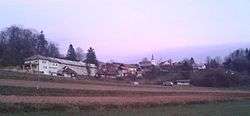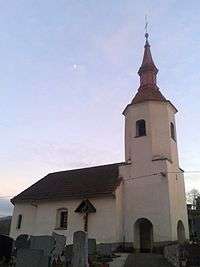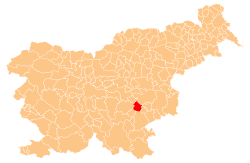Beli Grič
Beli Grič (pronounced [ˈbeːli ˈɡɾiːtʃ]; German: Heiligenkreuz[2]) is a small settlement in the Municipality of Mokronog-Trebelno in southeastern Slovenia. The area is part of the historical region of Lower Carniola. The municipality is now included in the Southeast Slovenia Statistical Region.[3]
Beli Grič Sveti Križ (until 1955) | |
|---|---|
 | |
 Beli Grič Location in Slovenia | |
| Coordinates: 45°56′31.13″N 15°7′30.81″E | |
| Country | |
| Traditional region | Lower Carniola |
| Statistical region | Southeast Slovenia |
| Municipality | Mokronog-Trebelno |
| Area | |
| • Total | 0.30 km2 (0.12 sq mi) |
| Elevation | 282.4 m (926.5 ft) |
| Population (2002) | |
| • Total | 51 |
| [1] | |
Name
The name of the settlement was changed from Sveti Križ (literally, 'Holy Cross') to Beli Grič (literally, 'white hill') in 1955. The name was changed on the basis of the 1948 Law on Names of Settlements and Designations of Squares, Streets, and Buildings as part of efforts by Slovenia's postwar communist government to remove religious elements from toponyms.[4][5][6] In the past the German name was Heiligenkreuz.[2]
Church

The local church in the settlement is dedicated to the Holy Cross (Slovene: sveti Križ) and belongs to the Parish of Mokronog. It was first mentioned in written documents dating to 1526 and was extended in the 17th century and restyled in the Baroque in the 18th century.[7]
References
- Statistical Office of the Republic of Slovenia
- Leksikon občin kraljestev in dežel zastopanih v državnem zboru, vol. 6: Kranjsko. 1906. Vienna: C. Kr. Dvorna in Državna Tiskarna, p. 82.
- Mokronog-Trebelno municipal website
- Spremembe naselij 1948–95. 1996. Database. Ljubljana: Geografski inštitut ZRC SAZU, DZS.
- Premk, F. 2004. Slovenska versko-krščanska terminologija v zemljepisnih imenih in spremembe za čas 1921–1967/68. Besedoslovne lastnosti slovenskega jezika: slovenska zemljepisna imena. Ljubljana: Slavistično društvo Slovenije, pp. 113–132.
- Urbanc, Mimi, & Matej Gabrovec. 2005. Krajevna imena: poligon za dokazovanje moči in odraz lokalne identitete. Geografski vestnik 77(2): 25–43.
- "EŠD 2053". Registry of Immovable Cultural Heritage (in Slovenian). Ministry of Culture of the Republic of Slovenia. Archived from the original on 30 April 2012. Retrieved 29 April 2011.
